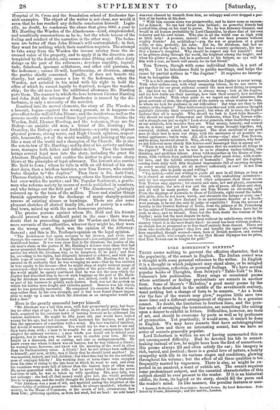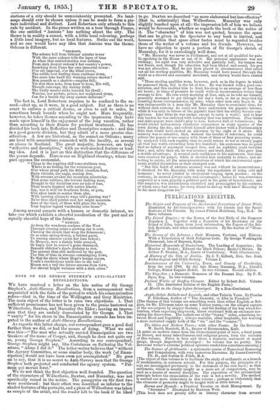LORD ROBERTSON'S SONNETS. * T kaiE seems nothing to prevent the
effective character, that is the popularity, of the sonnet in English. The Italian sonnet was a thought with some personal reference to the writer. In English it is a thought in which judgment may stand alone, or be mingled with description, reflection, or personal feelings. We have several popular books of Thoughts, from Selwyn's "Table-Talk" to Mrs. J-ameson's late publication. Many songs or occasional poems where sentiment or feeling predominate are sonnets in another form. Some of Moore's "Melodies," a good many poems by the writers who flourished in the middle of the seventeenth century, want nothing but a change of form to be sonnets. "As a beam o'er the face of the waters may glow," requires little save two more lines and a different arrangement of rhymes to be a genuine sonnet. No doubt, the limitation to fourteen lines, and the pecu- liar mode of arranging the terminations, are something like calling upon a dancer to exhibit in fetters. Difficulties, however, are tests of art, and should be overcome by poets as well as by professors of gymnastics. Yet practically, it would seem, it cannot be done in English. We may have sonnets that have autobiographical interest, here and there an interesting sonnet, but we have no series of sonnets generally popular.
Lord Robertson is within an ace of having surmounted this as yet unconquered difficulty. Had he devoted his life to sonnet- making instead of law, he might have been the first of sonnetteers. His poems always fill and often satisfy the ear ; his imagery is rich, varied, and poetical ; there is a genial love of nature, a hearty sympathy with life in its various stages and conditions, glowing throughout his volume ; but the effect of all these qualities is too frequently marred by vagueness. There is also, as might be ex- pected in an amateur, a want of subtile art. The sonnet requires some predominant subject, and the essential characteristics of this subject should be ever present to the reader. If it is an historical edifice, its form, its legend or its story, should fill the poem and the reader's mind. In like manner, the peculiar features or asso-
• Sonnets Reflective and Descriptive. Second Series. By Lord Robertson. Pub- lished by Fraser, Edinburgh ; and Orr and Co., London.
eiations of a city should be unmistakeably presented. No land- scape should ever be chosen unless it can be made to form a pic- ture individual and distinct Lord Robertson only attends to this rule by accident. In the pieces written on a tour through France, the one entitled " Amiens " has nothing about the city. The theme is in reality a sunset, with a little local colouring, perhaps
• a little local imagery, but no local features. Strike out the word, and no one would have any idea that Amiens was the theme. Orleans is different.
"ORLEANS.
The solemn bell from Orleans' minster tower With the same cadence tolls the lapse of time As when that sainted maiden rose sublime, From dark despair redeem'd her country's power, Snatching from Fame her own immortal dower : O'er orb imperial, o'er the lilied-crown, The rabble rout hurling these emblems down, The same lone knell thy warning echoes shower ! Man passeth as a shadow—empires fall ; Yet clod thou note, from hour to hour, His will, Though ruin rage, thy destiny fulfil.
The lordly master sinks beneath his thrall : Warrior, nor prelate, prince, nor sculptured stone, Can for a breath thy sway austere dethrone."
The fact is, Lord Robertson requires to be confined to the re- cord—shut up, as it were, in a good subject. But as there is no court to enforce a critical decree, or even to call to order, he sometimes break bounds when he ought not. More frequently, however, he takes themes according to the impression they have made upon himself in the enjoyment of the long vacation, rather than according to their fitness for poetical treatment. He has divided his book into Reflective and Descriptive sonnets : and this is a good generic division, but they admit of a more precise clas- sification. A few are historical, as the sonnet on Orleans ; many are local with associations connected with the locality, as several on places in Scotland. The great majority, however, are truly "reflective and descriptive," with no well-marked feature or lead- ing idea. And it is just on this distinction that the difference of the poems depends. Here is one on Highland clearings, where the poet opposes the economist.
"Clings to the toppling cliff some stubborn tree, Where is no footing for the venturous goat, O'er whose proud path the fitful cloudlets float,
Stern visitant, the eagle, soaring free,
With screams awakes the mountain minstrelsy. That scene sublime, the torrent dashing near, Brought to thy dauntless sons no tale of fear, Their hearts inspired with native liberty. Say, was it well for Southern flocks, or gain, O'er alien lands to scatter them afar, With burning climes to wage toil's panting war ? Ne'er thus shall patriot zeal her might maintain. Sons of the Gael, of these wild glens the heirs, Your hapless legend wandering echo bears."
Among several sonnets with a human or domestic interest, we take one which exhibits a cheerful recollection of the past and an equally cheerful hope of the future.
"MEMORY.
As from the wondrous confines of the West Through evening mists a glowing ray is sent, Piercing the clouds that wrap the firmament ; Or as some spring-flower, a belated guest, To waning summer yields her lone behest ; So Memory, now a stately bride arrayed, Or haply now in sorrow's guise dismayed, Beneath oblivion's shade disdains to rest. The present thus still mellowed by the past, The tide of time in streams commingling flows, To that far shore where Hope's benign repose, Youth's recollections torch-like to the last ! Mourn not a veil the future screens from view, Nor shroud bright welcome with a dark adieu."







































 Previous page
Previous page